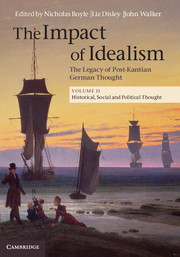Book contents
- Frontmatter
- Contents
- List of Contributors
- Acknowledgements
- List of Abbreviations
- Introduction: Idealism in historical, social and political thought
- 1 From transcendental idealism to political realism
- 2 The public of the intellectuals – from Kant to Lyotard
- 3 Idealism and the idea of a constitution
- 4 German Idealism and Marx
- 5 Ethos, nature and education in Johann Erich von Berger and Friedrich Adolf Trendelenburg
- 6 The concept and philosophy of culture in Neo-Kantianism
- 7 After materialism – reflections of Idealism in Lebensphilosophie: Dilthey, Bergson and Simmel
- 8 ‘Rationalisation’, ‘reification’, ‘instrumental reason’
- 9 Freedom within nature: Adorno on the idea of reason's autonomy
- 10 German neo-Hegelianism and a plea for another Hegel
- 11 Idealism and the fascist corporative state
- 12 Love and recognition in Fichte and the alternative position of de Beauvoir
- 13 Hegel's concept of recognition and its reception in the humanist feminism of Simone de Beauvoir
- 14 Giving an account of oneself amongst others: Hegel, Judith Butler and social ontology
- 15 Idealism in the German tradition of meta-history
- Bibliography
- Index
- References
8 - ‘Rationalisation’, ‘reification’, ‘instrumental reason’
Published online by Cambridge University Press: 05 December 2013
- Frontmatter
- Contents
- List of Contributors
- Acknowledgements
- List of Abbreviations
- Introduction: Idealism in historical, social and political thought
- 1 From transcendental idealism to political realism
- 2 The public of the intellectuals – from Kant to Lyotard
- 3 Idealism and the idea of a constitution
- 4 German Idealism and Marx
- 5 Ethos, nature and education in Johann Erich von Berger and Friedrich Adolf Trendelenburg
- 6 The concept and philosophy of culture in Neo-Kantianism
- 7 After materialism – reflections of Idealism in Lebensphilosophie: Dilthey, Bergson and Simmel
- 8 ‘Rationalisation’, ‘reification’, ‘instrumental reason’
- 9 Freedom within nature: Adorno on the idea of reason's autonomy
- 10 German neo-Hegelianism and a plea for another Hegel
- 11 Idealism and the fascist corporative state
- 12 Love and recognition in Fichte and the alternative position of de Beauvoir
- 13 Hegel's concept of recognition and its reception in the humanist feminism of Simone de Beauvoir
- 14 Giving an account of oneself amongst others: Hegel, Judith Butler and social ontology
- 15 Idealism in the German tradition of meta-history
- Bibliography
- Index
- References
Summary
Idealism in the history of European philosophy has taken, broadly speaking, two main forms. In the first, the term ‘idealism’ refers to the view that the ultimate constituents of reality, and thus the ultimate objects of possible human intellection are entities called ‘ideas’. Such entities are mind-independent; cognitive access to them involves decreasing to a minimum obstacles native to being human impinging on that access, sharpening special capacities that enable such access, or both. Plato's theory of forms is this sort of account. An idea or form (εἶδος, ἰδέα) is a fundamental structure of the world and knowing one, or a system of them, is a matter both of diminishing the effect on human cognition of transient, misleading sensuous and dispositional elements in experience and developing a special sort of intuition that can ‘see’ the idea in question.
The second type of idealism conceives of the structure of what is real on the model of structuring, i.e. in roughly intentional terms. In this tradition, ideas are mental items, hence not mind-independent, and are only with substantial qualification fundamental constituents of reality. What systematises such items is a theory of human reason and this, more than anything else, is why it is appropriate to consider idealist philosophy of this mien under the heading ‘rationalism’. There are several differing and systematic renderings of why rationalism emerged as one of the dominant trends in modern philosophy, but all stress in various ways the advent of new and powerful models in physics and other sciences that had the effect of leaching out of the idea of reality any purposive structure. Ideas are closely related to ends, even in antiquity, and the problematic status of de re purposes in modern philosophy, which was strongly responsive to the accumulation of scientific discoveries leading up to Newtonian mechanics, resulted in ideas being relegated to the subjective side of the cognitive equation and a consequent exacerbation of the problem of access to reality through such ideas. The word ‘through’ is no throwaway: ideas both are the means by which one can comprehend reality and potential blocks to that comprehension. It is only by the dual processes of policing the content of the ideas and by soundly accumulating them that objectivity is preserved.
- Type
- Chapter
- Information
- The Impact of IdealismThe Legacy of Post-Kantian German Thought, pp. 186 - 207Publisher: Cambridge University PressPrint publication year: 2013
References
- 1
- Cited by



